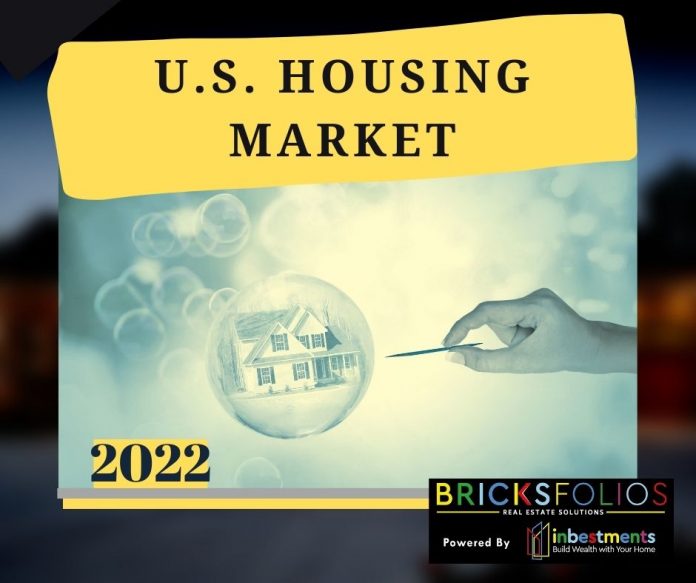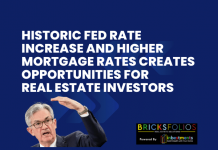In 2021, the U.S. housing stock gained $6.9 trillion, easily the most in one year. Over the past decade, the value of the housing market in the U.S. has more than doubled since the post-recession lows and the corresponding building slump.
In Washington, Northwest MLS reports a 20.4 percent system-wide increase in prices for single-family homes (excluding condominiums). From only $490,000 in 2020, prices increased to $590,000 in 2021. Meanwhile, condominium prices also rose 11.8 percent, from only $380,000 in 2020 to $425,000 in 2021.
Mortgage rates are also escalating to pre-pandemic levels. Just this week, we saw an increase once again in mortgage rates. From an annual average of 2.96 percent in 2021 and 3.11 percent in 2020, 30-year fixed-rate mortgage is now 3.69 percent according to Freddie Mac.

Is the U.S. housing market going to crash in 2022 following this unprecedented growth in 2021?
Before you spell doom, let us give you a brief background of the U.S. housing market and what’s driving its growth.
#1 Law of Supply and Demand
The rising home prices are attributed to the fact that there is just a high demand for houses at this point while the inventory of houses up for sale is low. It is simply a matter of the law of supply and demand. What we are seeing right now is rather a very dynamic housing market with more buyers than sellers (i.e., sellers’ market). As more home buyers enter into bidding wars, sellers have the opportunity to price their homes more than the actual market value.
For a housing market to be balanced, it needs about 4 months’ worth of inventory. Last year, the U.S. housing market inventory was so low that each month, it had no more than a month of supply.
Nevertheless, even before the pandemic, there was already a low volume of available houses for sale. The last time the U.S. housing market had at least four months of inventory was in February 2014.
In Washington, there were 0.75 months of inventory at the start of 2021, but by the end of the year, it had dropped to 0.40 months (about 12 days). Yes, homes are selling like hotcakes.
#2 The US is not building enough homes
According to a report from Realtor.com, the United States is short 5.24 million homes, an increase of 1.4 million from the 2019 gap of 3.84 million. Census data shows that 12.3 million new American households were formed between January 2012 and June 2021, but only 7 million single-family homes were constructed during that period.
A severe labor shortage plagued single-family home construction long before the pandemic hit, but the pandemic made it worse. Although new household formation is actually slower than it was before the pandemic, homebuilders would have to double their new home production pace to close the gap in five to six years. This is highly unlikely to happen.
Washington’s shortage was the 8th-highest in the U.S., according to Up for Growth’s Housing Underproduction in the U.S. report. This underproduction is severe in counties in central Puget Sound – King, Pierce, Snohomish and Kitsap, which have the most high-paying tech jobs. These counties need a total of 810,000 new housing units to accommodate the region’s population growth by the year 2050, according to Puget Sound Regional Council.


#3 Demographics
Millenials dominated the U.S. housing market in the previous year with 51 percent home-purchase loan applications in 2021. There was an upward trend of home buying as more millennials are entering into their first-time home-buying age of 30.
#4 COVID-19 Pandemic
Covid-19 transformed not just our homes but their purpose. This further fuelled the home buying spree everywhere. The lockdowns and nature of work (i.e., remote work) have geographically shifted many workers. Those living in the cities and large urban centers who were severely affected by the pandemic fled for safety in areas that are more expansive like in the suburbs, exurbs, and smaller cities. Accustomed to the price points in big cities, these city-dwellers trying to find new homes in less busy areas saw affordable homes despite the increased house prices. For many of them, it seemed like a bargain compared with house prices in the city.
#5 Low-Interest Rates
Many of those who bought in the last two years also enjoyed super-low interest rates, which made the market generally attractive to many homebuyers.
Current Growth Is Not Sustainable, But a U.S. Housing Market Crash is Unlikely
While we are seeing an overvalued housing market, it doesn’t necessarily mean it is a bubble. At this point, there is no hyper-expansion in the real estate market (i.e., when home building exceeds demand). Hyper-expansion in real estate usually happens when the market turns speculative with investors (e.g., home flippers dominating the market). While such investors have picked up in recent months, it’s not enough to cause a bubble.
Even with plenty of lands for developers to build, NYT columnist and Nobel Laureate Paul Krugman point out that, this all boils down to the supply chain. You may not agree with Krugman for his other predictions and assessments, but the indisputable fact is since the pandemic, the price of construction materials has risen steeply. This made homebuilding even more expensive and complicated as the COVID-19 pandemic disrupted the global supply chain.

Another thing to look out for in a bubble is the homebuyers’ capacity to pay. The good news is that it seems we have learned from our past mistakes and safety measures are now put in place to prevent another housing collapse. Today, mortgage credit availability is a lot tighter than it previously was in the mid-2000s.
What Should We Expect In The U.S. Housing Market This 2022?
#1. For starters, the U.S. housing market in 2022 will probably cool off a bit. Home prices will stabilize in some areas, specifically in hyped-up parts of the housing market. However, there will be some areas where home prices will continue to rise given the low inventory, but probably not as high as last year, but still substantial.
#2. Meanwhile, inventory will remain low. As new variants of COVID emerge after every few months, even with the vaccine, likely, the global supply chain will not return to normal this year. Labor shortages also continue to be a problem across the country.
#3. Lastly, mortgage rates are also likely to continue to rise as we are seeing an increase in the inflation rate, which is one of the key drivers of rising mortgage rates. In the latest data released by the Bureau of Labor and Statistics, we are seeing inflation at its peak in 40 years. Nevertheless, mortgage rates are still historically low, which experts believe to be favorable. So, if you’re looking into refinancing, experts suggest refinancing only if you can get a new mortgage rate that’s close to 0.75% lower than your current rate.
What Do These Market Trends Mean For Buyers/ Real Estate Investors?
If you’re planning to purchase a house this 2022, we know you’re probably feeling a lot of emotions right now. There’s exhilaration and excitement at the thought of finding and moving into your dream home or buying an investment property. At the same time, there’s also an overwhelming feeling of navigating into the wild real estate market and a bit of panic and worry if you’re doing the right thing.
However, investing in real estate does not have to be stressful. There are companies that can help you. BricksFolios and InBestments, for example, can assist you, not just in navigating into the housing market, but to start building your wealth through smart real estate.
Yes, some things are out of your control like skyrocketing home prices and increasing mortgage rates. While this may ultimately affect your buying power, you shouldn’t necessarily worry about trying to time the market. Because you will never know when you can make the best deal unless it’s done. Whether you like it or not, we predict that home prices will continue to appreciate. Further delay will only cost you more by paying higher prices and higher mortgage interest rates.
That said, before you take the plunge, it’s always very helpful to be prepared. Don’t just buy homes. Buy true wealth-building homes. Let BricksFolios help you achieve financial freedom through real estate. Contact us NOW to get started!





